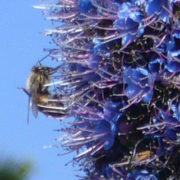The buzzing; the buzzing
As you well know, caterpillars are major pests of plants. What you may not know is that they feed constantly during their waking hours. Life is not all paradise for them, however since they can serve as food to other organisms. One of their afflictions is parasitic wasps, which lay their eggs on the caterpillars. The wasp larvae then eat them from the inside (isn’t Nature wonderful?). To avoid this fate, caterpillars have become very sensitive to the presence of wasps. They have sensory hairs that detect the airborne presence of the wasps. This causes them to “stop moving…or drop off the plant.”
Since caterpillars have such an extreme reaction in the presence of the parasitic wasps, Tautz and Rostas of the University of Wurzburg in Germany wondered if the sound of honeybees might have an adverse effect on the caterpillars. They studied beet armyworm caterpillars (Spodoptera exiguea) that feed on a large number of plants, efficiently sense the wasps’ airborne vibrations, then stop moving or drop off the plants in the presence of their parasites. They set up bell pepper or soybean plants in experimental tents. One tent was connected to a hive that enabled the bees to fly over the plants to two feeders filled with non-scented sugar solutions. They had another control tent that had the same number and species of plants and caterpillars, but did not have bees.
The caterpillars reacted to the bees just like the wasps and destroyed 60-70% less foliage than in the tent without the bees! The bees just flew over the caterpillars; they did not approach them. This indicates that the vibration alone of the bees buzzing by was enough to stop the caterpillars in their tracks! This suggests a novel way of protecting plants without using pesticides. One can only wonder if the caterpillars would evolve to ignore the vibrations of the bees and continue their munching. Despite our best efforts at plant control, the targets frequently evolve a resistance to our efforts.
Reference:
Tautz, J. and M. Rostas. 2008. Honeybee buzz attenuates plant damage by caterpillars. Current Biology 18:R1125-R1126.



